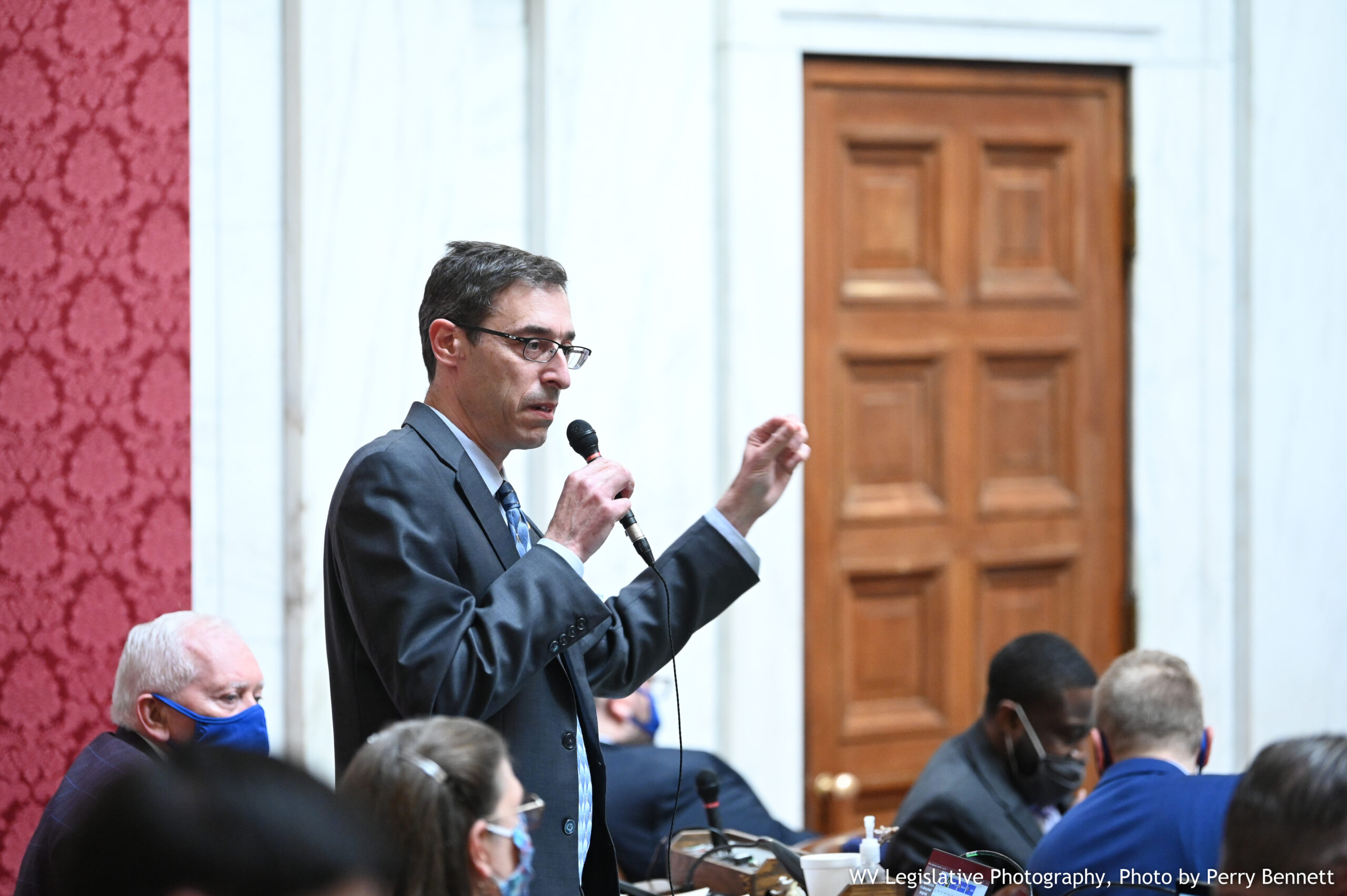MORGANTOWN – The House of Delegates overwhelmingly approved on Wednesday a bill to exempt 800-plus oil and gas industry tanks from the 2014 Aboveground Storage Tank Act and a bill to create liability protections for employers and others in COVID-19 related lawsuits.
HB 2598 is the above-ground tank bill. Debate on the bill lasted more than an hour, with most of the discussion coming from opponents concerned about potential drinking water contamination.
It would exclude from the AST Act’s inspection requirements tanks having a capacity of 210 barrels (8,820 gallons) or less, containing brine water or other fluids produced in connection with oil and gas production activities within a zone of critical concern.
A zone of critical concern (ZCC) is defined as five hours or less upstream of a drinking water intake.
Energy Committee vice chair John Kelly, R-Wood, said the waste tanks in question belong to small, barely profitable conventional well operators who will be forced into expensive upgrades after the ZCCS were revised to include new territory. This may cause them to either plug those wells or go out of business.
Delegate Ric Griffith, D-Wayne, recalled what delegates learned in committee: the bill would exempt 887 tanks, 12% of them containing brine and 78% containing petroleum and other pollutants – some of them toxic, including barium, radium and volatile BTEX compounds (benzene, toluene, ethylbenzene and xylene).
Last year, he said, inspections uncovered 38 tank leaks, 24 of those included in this bill.
Delegate Evan Hansen, D-Monongalia, participated in the 2014 legislation as a consultant and adviser from Downstream Strategies. He said Wednesday that questions then included which tanks should be regulated and what level of risk should be tolerated.
The bill has been fine tuned, since then, he said to eliminate many tanks that don’t need regulation and focus on those that pose the highest threat: the biggest, those that contain harmful or toxic substances, and those closest to and upstream from drinking water intakes.
Referring to the 887, he said, “These tanks do contain harmful substances.” In the case of a leak, those substances won’t necessarily float by an intake as oil would; some substances dissolve in water and can be drawn in to the supply. The AST Act minimizes risk through inspections and maintenance.
DEP opposes the bill, he said, because the program works. If the bill passes, the responsbility would fall to DEP’s underfunded and understaffed Office of Oil and Gas, which has one inspector for every 7,000 wells.
Additionally, he said, Morgantown Utility Board opposes the bill. MUB has seven of these tanks in its ZCC and 200 adjacent to streams that flow toward its intake.
Energy chair John Anderson, R-Wood, reminded delegates that the 2104 Freedom Industries spill wasn’t brine or crude oil. In 2020, he said, there were just two incidents involving oil and gas industry in ZCCS and no emergencies.
The House, he said, has in recent years passed three bills to help plug 4,000-plus abandoned wells in the state. “If we do not give some relief to these operators we’re going to add several hundred more tanks where people are going to be going bankrupt.” Operators will abandon wells and hundreds or thousands of families will lose access to free gas, he said. “That creates a crisis for them.”
He also noted that trucks and trains and barges haul chemicals and there’s always a potential for an accident. “I believe the removal of this restriction … is an acceptable risk we have to take at this particular point in time.”
Kelley noted that 120 leaks have been reported since AST Act inspections began in 2015 and none have reached ground water. Producers value the contents of those tanks and inspect them regularly. The bill affects only 887 of more than 44,000 industry tanks, 27,262 that are brine tanks.
“I demand clean water. I demand clean air. I demand regulations, but I demand fair regulations,” he said.
The vote was 74-26 with one Democrat voting yes and four Republicans voting no. All local delegates voted with their party. It heads to the Senate.
COVID liability bill
SB 277 is called the COVID-19 Jobs Protection Act.
It comes from the governor and is intended eliminate the liability of “all persons including individuals, health care providers, health care facilities, institutions of higher education, businesses, manufacturers … and to preclude all suits and claims against any persons for loss, damages, personal injuries, or death arising from COVID-19 [and] provide assurances to businesses that reopening will not expose them to liability for a 41 person’s exposure to COVID-19.”
A House floor amendment exempted from protection anyone “who engaged in intentional conduct with actual malice.” The bill would take effect retroactively on Jan. 1, 2020, before the first confirmed COVID case in the state.
Delegate Shawn Fluharty, D-Ohio, determined in a back and forth with Judiciary chair Moore Capito, R-Kanawha, that there are about 8,000 COVID-related suits across the country, but so far only six in West Virginia. Fluharty said that doesn’t demonstrate much need for the bill here.
Meanwhile, he said, the governor reported Wednesday that 70 facilities across the state failed to report 168 deaths in January and February.
The Capitol is closed to the public, he said. “Now we’re going to use COVID as an excuse to close courthouse doors for our people. … This is disgusting, you’re going to let bad actors get away.”
Capito said that compromise often fails to make either side happy and this bill is an example. “Neither side of this debate is very happy.” But without it, the state is asking businesses to open without providing predictability and the bill offers a bill offers a balance between the bad actors and those doing they best they can, he added.
SB 277 passed 76-24 with one Democrat voting yes and two Republicans voting no. It goes back to the Senate for amendment concurrence.
Tweet David Beard@dbeardtdp Email dbeard@dominionpost.com




